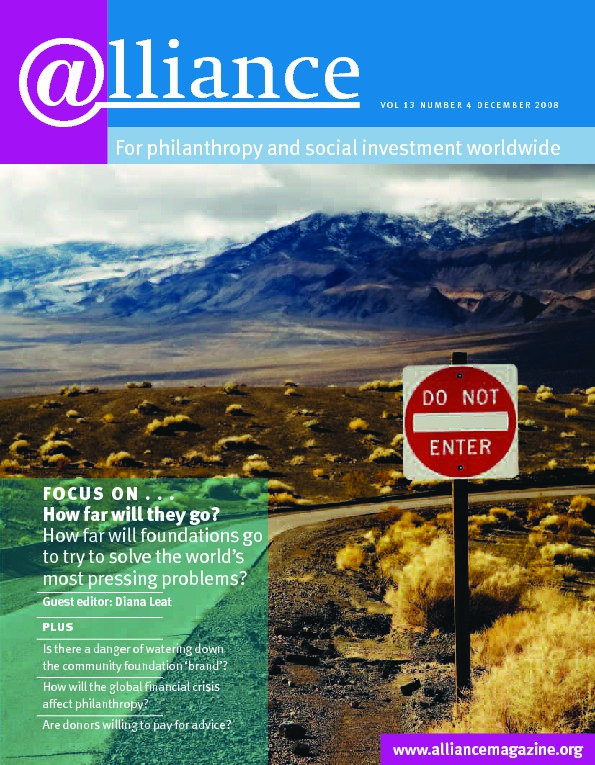 When it comes to financial matters, few could argue that expert advice applied prudently could be a bad thing. This is as true of philanthropic investments as it is of stocks, yet until recently the kind of personalized advice that the affluent have expected from their financial advisers has not been available for the philanthropic sector. Now it seems that demand among donors is growing and philanthropic advisory firms are mushrooming; indeed this looks like a growth industry. Yet the question remains: are donors willing to pay for the advice they say they want?
When it comes to financial matters, few could argue that expert advice applied prudently could be a bad thing. This is as true of philanthropic investments as it is of stocks, yet until recently the kind of personalized advice that the affluent have expected from their financial advisers has not been available for the philanthropic sector. Now it seems that demand among donors is growing and philanthropic advisory firms are mushrooming; indeed this looks like a growth industry. Yet the question remains: are donors willing to pay for the advice they say they want?
As an example of the demand, one might cite the Boston College Center on Wealth and Philanthropy’s Wealth with Responsibility report, in which 66 per cent of wealthy donors surveyed said they would give more and differently if they had information about the effectiveness of their gifts.
The advisers
This demand has spawned a number of so-called donor advisory firms. Among them are the not-for-profit New Philanthropy Capital, created in the UK in 2002 by Gavyn Davies and Peter Wheeler, one-time partners at Goldman Sachs, to provide what they felt they lacked for their own giving needs: standard research for the high-level perspective, and a bespoke advisory service. Geneva Global, a US for-profit firm, was also founded by two wealth holders who couldn’t find good advice on the market, and it matches donor grants with humanitarian projects in the developing world. Wise partnership, based in Geneva, and Arabella Philanthropic Investment Advisors, based in the US, likewise help wealthy individuals and families develop a giving strategy, provide due diligence on potential grantees, and evaluate the impact of the gift.
According to Wayne Farmer of Arabella, its donors want to be proactive rather than reactive. ‘And that involves a greater level of strategy and aligning each gift in the context of a longer-term goal.’
All of these owe a nod to Rockefeller Philanthropy Advisors. The original philanthropy service of the Rockefeller family, RPA has existed as a free-standing non-profit since 1991, when it began helping wealthy clients outside the Rockefeller dynasty take a more hands-on approach to their giving.
This expansion in the number of providers from one to many suggests that wealth holders want good philanthropic advice. But as the market evolves, more of them are struggling with the question of whether, despite purported need, donors are truly willing to pay for the service.
Information aggregators
The value of any adviser is directly proportional to how difficult it is to gather useful information. There are no standard reporting requirements for charitable organizations, and some advisers have taken advantage of this by providing standard research to interested parties. NPC produces its charity evaluations, while Arabella publishes an annual High Impact Giving Opportunities document. These are exceptions, however. Mostly, research created by donor advisers is customized for one client and proprietary to the organization.
But standardized research and information is increasingly available from a number of aggregators. Among them is SmartLink, a free information service supported by the US-based Neighborhood Funders’ Group. ‘The fastest growing segment of philanthropic funds is coming from individual donors or unstaffed family foundations,’ says Elizabeth Myrick, director of SmartLink. NFG wanted more information for donors as it became clear from donors that ‘the “millionaire next door” was struggling to find out how to make a difference on issues of huge import, such as poverty, which seem so overwhelming’.
SmartLink attempts to simplify the issue of neighbourhood poverty by dividing it into smaller issues, such as housing, employment, health and schools. It provides detailed information and a list of important questions that donors should ask non-profits. Donors moving into new areas often lack confidence in the topic, Myrick suggests, ‘and they might feel they lack the capacity to ask good questions of potential recipients’.
While SmartLink provides donors with the information to do their own evaluations, others see their role as giving specific answers to the question of where to give. GiveWell, a non-profit project started by two hedge fund professionals and subsidized by a few large donors, solicits charity applicants active in five poverty-related areas and applies a relatively transparent, in-house methodology to determine which organization is the most effective in the category. The ‘winner’ receives a grant for $25,000, but the real point of the initiative is to publish the detailed information provided by the charity along with the evaluation process and results. At their most basic, both SmartLink and GiveWell are systematizing what donors have done informally for years: sharing the experience of giving so that others can learn and apply the lessons.
Another model for standardizing this exchange is provided by the Global Philanthropy Forum and The Philanthropy Workshop West. Both sponsor conferences and seminars that allow like-minded donors to access philanthropy experts and to exchange ideas about worthwhile international causes and recipients. GPF and TPW-W are open to any donor willing to pay to attend, and both are heavily subsidized by foundation funding.
To subsidize or not to subsidize
The anecdotal and statistical evidence that donors want more information to inform their giving is convincing, as is the high level of participation of donors in networking forums such as the GPF. But, to come back to our original question, are they willing to pay for advice? If the need is so great, why are so many of the donor advisers subsidized?
Wise partnership and Arabella claim to be self-sustaining, but they are the only ones who are. ‘We are continuing to grow,’ says Farmer from Arabella. ‘We see an incredible appetite for the services we are providing.’ Yet Arabella works with corporations and institutional foundations as well as individuals and families, and Farmer says that their client base is split 50-50. An ‘increasing chunk’ of Arabella’s business also involves back office services for small and family foundations.
Etienne Eichenberger of wise partnership concedes that running a sustainable model involves strategic choices about what you can and cannot offer. ‘We have had to make choices about services we will not offer, such as in-depth, in-house research.’
Despite the challenges of managing without it, Eichenberger is adamant that subsidy comes at too high a price. ‘There is a risk when you are subsidized that the front desk does not have the same vision as the people who are funding the organization. There is no free money.’
The challenge of clashing visions is real, especially when one of the main selling points of donor advice is neutrality. Donors who take advice from subsidized organizations may find the information skewed towards the philosophy and mission of the subsidizer – especially if there’s only one. This is of particular concern in the Gates Foundation era, in which a few large entities have outsized influence on how dollars get spent.
Failure of the standard product model
Unfortunately, very few providers have the luxury of choice. For virtually everyone in the market, self-sustainability is proving difficult. Since December 2007, Geneva Global has trimmed its staff of more than 100 to 11, and its original founders have transferred ownership to a member of the management team, according to a company press release. The New Progressive Coalition, which also adopted a standardized, scalable approach, has closed its doors.
Logic suggests that companies with a standard product they can sell to many buyers would be successful on account of the scale they can achieve, but all signs to date suggest that the opposite is true. The players that are surviving under their own power are the ones that are providing highly customized, high-level advice with proportionately little detailed information.
Geneva Global is a case in point. The original model involved a network of local professionals on the ground in developing regions creating highly detailed, semi-standardized portfolios of effective organizations. Staff reductions have dissolved this on-the-ground network, and the new GGI will presumably adopt the same high-level, bespoke approach as Arabella and wise partnership. The financial information on NPC’s website shows their fee services account for less than 15 per cent of 2007 income; the rest is made up largely of grants and other donations.
While the donor advisory market focuses on bespoke advice, the services will remain expensive, the providers relatively small, and the number of donors able to enjoy them few. It also opens the door for those organizations that the wealthy have always turned to for advice: wealth advisers and banks.
Myrick says SmartLink is actively exploring whether bank partnerships can provide long-term sustainability while wise partnership already does work in cooperation with ‘selected private banks and multi-family offices’. ‘One of the places where we imagine there might be a possibility of sustainable funds or a value proposition with banks is around next generation issues,’ says Myrick.
Indeed, involving the next generation is a hot area in philanthropic advice. Doug Freeman of IFF Advisors, a wealth advisory firm focusing on family issues, says that almost half the families he works with use the firm’s philanthropic advisory services to ‘build effective philanthropy multi-generationally’.
‘Different family members have different points of view about how they want to change the world. There is a lot of emotion there,’ says Wayne Farmer of Arabella. ‘A lot of our clients are looking for the value and efficiency of a third-party perspective to help navigate that.’
Laura Starita is the managing editor of Philanthropy Action, an online journal for high-net-worth donors. Email laura.starita@philanthropyaction.com
Full disclosure in 2006 and 2007 the author provided editorial services on a freelance basis for a now-defunct online publication sponsored by Geneva Global.
 Comment Martin Brookes
Comment Martin Brookes
Whether, like New Philanthropy Capital (NPC), you’re a non-profit organization providing philanthropy advice or you have decided to operate as a for-profit organization, building a viable business model can be a challenge.
This point was identified in recent research commissioned by NPC, along with wise Partnership and the Bertelsmann Stiftung (and funded by Investec Trust, Butterfield Bank and Atlantic Philanthropies). The report, More advice needed, which was based on interviews with 100 private client advisers across Europe, noted that private banks among others are grappling with the question of how to charge for philanthropy advice.
However, although additional income is seen by trusted advisers as one of the benefits of offering philanthropy services, this is not typically their motivation for doing so. Instead, they identify the chance to deepen client relationships and also to win new clients through referrals as key factors behind their desire to offer philanthropy advice.
The flipside of the coin – the cost of delivering advice – is important to consider alongside the issue of income. The research showed, for example, that it can be cheaper for advisers to use third parties rather than building all the resources in-house. It’s worth remembering that philanthropy advice is an emerging market and needs shaping. This means that people need to be prepared to employ a loss leader strategy at times and to work more collaboratively with other advisers in order to build awareness and stimulate demand for the service.
The fees NPC generates from clients are an important income stream. However, as a charity committed to public knowledge, while we keep one eye on the bottom line, we see delivering advice as part of our broader mission to improve the effectiveness of funding for charities rather than as an end in itself. (Incidentally, our fees generate more than 15 per cent of our income, as indicated by Laura Starita, but the picture is a complicated one because of the overlap between fee and grant income.)
Many clients do pay a fee to NPC for advice and support on building a giving strategy, finding effective charities, or building their staff’s knowledge around philanthropy, among other services. However, we are also committed to keeping all of our research reports and analysis on charities freely available on our website for anyone to access.
Organizations like NPC are evidence that donors who wish to apply the same business rigour to their charitable investments as their other financial investments will, and are, paying for advice. It is still early days for organizations looking to build a marketplace around effective giving. But in these more straitened times, when donors are focusing more than ever on making their charitable donations work harder and go further, we believe that demand for advice on effective philanthropy will only increase.
Martin Brookes is Chief Executive of NPC. Email MBrookes@philanthropycapital.org





Comments (0)
I see it too. Geneva Global is a typical company where scale does not bring success. We learn useful lessons from this example.